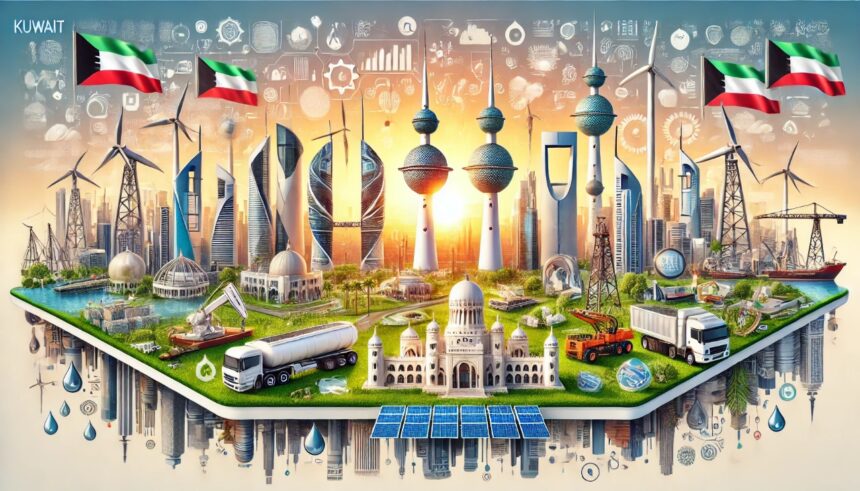Kuwait has struggled to diversify its economy away from the oil sector and promote the development of the private sector.
While they have largely enjoyed the benefit of their vast oil wealth, the nation’s over-reliance on a single resource has stifled the development of the private sector.
The country’s economy has danced to the tune of the global oil market for far too long, and they are now on the verge of suffering the consequences.
According to Kuwait’s Finance and Investment Minister, Dr Anwar Al-Mudhaf, the country is anticipating a budget deficit of $85 billion over the next four years. The nation has accumulated deficits totalling $107.7bn, which has caused a massive strain on the national reserve.
The situation has expedited the need for economic reforms, and Kuwait must prioritise diversifying the economy to keep their head above water and secure their future.
Diversification is Key to Kuwait’s Prosperity
There is no sugarcoating the fact that Kuwait needs to reduce its dependence on oil.
It is crucial to their long-term stability, but simply shutting down oil production will trigger an immediate financial crisis, given that 90% of the nation’s fiscal revenue comes from exporting oil.
There’s a more delicate and nuanced way to navigate the situation, but it involves collaborating with the oil companies and incentivising them to invest in the non-oil sector.
The Kuwaiti government can implement tax incentives and regulatory reforms that encourage oil companies to expand their operations into the non-oil sector.
Reducing oil production will undoubtedly create a gaping hole in revenue, but this strategy could help bridge that gap. It could also be a positive step towards diversifying the nation’s economy.
The Kuwaiti government could also focus on improving the nation’s private sector. This can become the driving force of the country’s diversification process, but several aspects need to be addressed in that regard.
The government needs to create a platform for private companies to collaborate with oil companies that have bought into the idea of expanding their business into the non-oil sector.
Such partnerships could berth the development of crucial infrastructures such as building schools, universities and medical facilities.
Regulations are necessary, but bureaucracy can sometimes be the kryptonite to innovation, so getting rid of any unnecessary red tape that doesn’t benefit the private sector is paramount.
The Kuwaiti government should also prioritise the national policy agenda that attracts foreign direct investment (FDI).
The nation is lagging behind its fellow Gulf Cooperation Council (GCC) peers in attracting FDI, and the ripple effect is a lack of fresh ideas and cutting-edge technologies that could propel the nation forward.
The Kuwaiti private sector is not developed enough to compete in the global market, which is a key area the government must address amid plans to inject new life into the economy.
One unconventional industry that Kuwait could consider for diversification is online gambling. The nation has implemented strict laws concerning such activities, so Kuwaiti players are forced to engage via overseas platforms.
Gambling is traditionally viewed as a taboo in the Middle East due to religious beliefs, but several Middle East countries are cautiously dipping their toes into it.
The United Arab Emirates (UAE) has already explored gambling as a form of generating revenue, albeit with heavily regulated systems.
Observing how neighbouring countries handle online gambling may provide a roadmap for Kuwait to implement a similar system, which could be a lucrative move for the nation.
Kuwait’s Vision 2035 project seeks to make the nation more competitive and incorporating online gambling into the scheme could be a sensible move.
It could lead to the establishment of more real money online casinos in Kuwait, eliminating the need for gamers to seek regulated platforms overseas.
WAMD Could Open the Door to iGaming in Kuwait
As a further indication that Kuwait could loosen its stance on gambling, the Kuwaiti Central Bank recently approved a new instant payment system.
WAMD not only has the potential to be a game-changer for the nation’s financial landscape, but it could also pave the way for the introduction of a heavily regulated online gambling sector.
The system is expected to add value and quality to the nation’s payment infrastructure and serve as a safe and advanced payment option that caters to the needs of different customers.
WAMD offers a secure and user-friendly way to transfer money using just a phone number. Its ease of use could make it highly attractive to potential iGaming customers, who would be able to deposit and withdraw funds quickly and conveniently.
The launch of WAMD comes amidst a wave of similar instant payment systems being rolled out across the Middle East, such as Fawran in Qatar and Aani in the UAE.
The regional trend suggests that some Gulf States are open to digital financial innovation, which could influence Kuwait’s stance on iGaming regulations.
WAMD’s launch doesn’t automatically guarantee that iGaming will be legalised in Kuwait. Such activities are still prohibited, and there’s no indication that the situation could change anytime soon.
However, if Kuwait decides to explore iGaming, a well-regulated system could offer several benefits, including job creation in areas such as customer support, technology and marketing.

